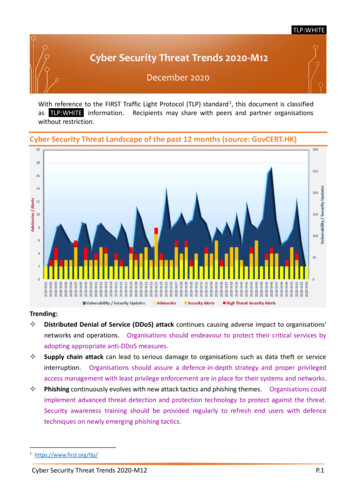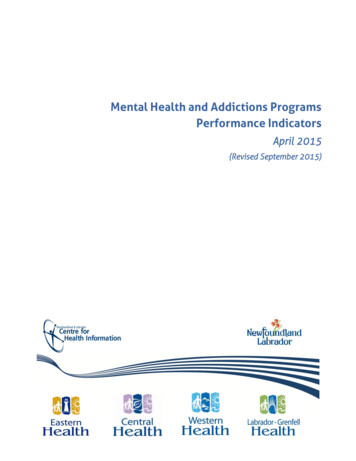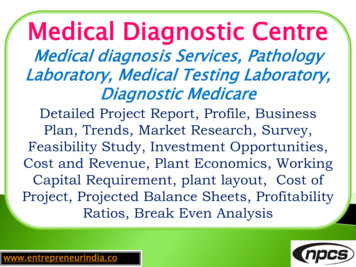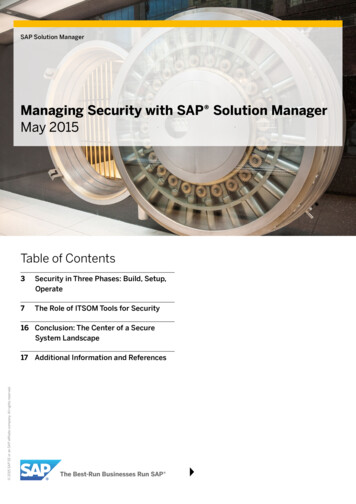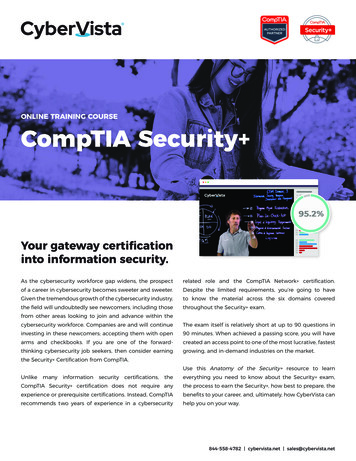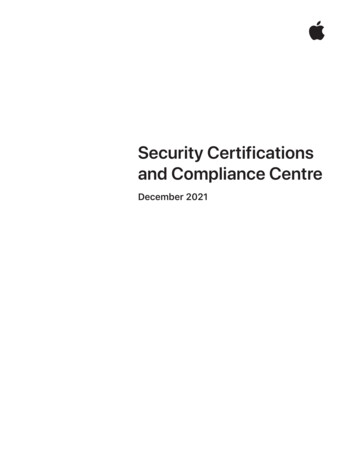
Transcription
Security Certificationsand Compliance CentreDecember 2021
ContentsIntroduction to Apple security assurance4Hardware certifications5Service certifications6Hardware security certifications7Apple hardware security certifications overview7Software and app certifications5Security certifications for the Secure Enclave Processor10Operating system security certifications19Apple operating system security certifications overview19Security certifications for the Apple T2 Security ChipSecurity certifications for iOSSecurity certifications for iPadOSSecurity certifications for macOS15233036Security certifications for tvOS44Software security certifications52Apple software security certifications overview52Security certifications for watchOS48Security certifications for Apple apps54Security certifications for Apple internet services57ISO/IEC 2700157ISO/IEC 2701858Certifications59Apple services covered by ISO/IEC 27001 and ISO/IEC 27018Security Certifications and Compliance Centre582
macOS Security Compliance Project60Document revision history61Glossary62Security Certifications and Compliance Centre3
Introduction to Apple security assuranceAs part of our commitment to security, Apple regularly engages with third-party organisationsto certify and attest to the security of Apple’s hardware, software and services. Theseinternationally recognised organisations provide Apple with certifications that align witheach major operating system release. In this way, they provide a measure of confidence —that is, security assurance — that the security needs of a system are being satisfied. Fortechnical areas that aren’t accepted under mutual recognition arrangements (MRAs) or thatlack mature security certification standards, Apple is engaged with developing appropriatesecurity standards. Our mission is to drive globally accepted, comprehensive coverage ofsecurity certification across all Apple hardware, operating systems, apps and services.Certifications are often necessary to meet the requirements of legislation, regulation andindustry norms. Services like Apple School Manager and Apple Business Manager arecovered under Apple’s ISO/IEC 27001 and ISO/IEC 27018 certifications. All customers,including government agencies and enterprise and education organisations deployingApple devices can use the hardware, operating system, software and services certificationsto support demonstrating compliance.Security Certifications and Compliance Centre4
Hardware certificationsBecause secure software requires a foundation of security built into hardware, all Appledevices — whether using iOS, iPadOS, macOS, tvOS or watchOS — have security capabilitiesdesigned into silicon. These include custom CPU capabilities that power system securityfeatures and silicon dedicated to security functions. The most critical component is theSecure Enclave coprocessor, which appears on all modern iOS, iPadOS, watchOS and tvOSdevices, on all Mac computers with Apple silicon and Intel-based Mac computers with theApple T2 Security Chip. The Secure Enclave provides the foundation for encrypting data atrest, secure boot in macOS and biometrics.Apple’s commitment to security assurance starts with the certification of the foundationalsecurity components in silicon, from the hardware root of trust to the secure boot enforcement,the Secure Enclave providing secure key store, and the secure authentication with Touch IDand Face ID. The security features of Apple devices are made possible by the combinationof silicon design, hardware, software and services available only from Apple. Certification ofthese components is an important part of verifying the assurance that Apple provides.For information on public certifications related to hardware and associated firmwarecomponents, see: Security certifications for the Apple T2 Security Chip Security certifications for the Secure Enclave ProcessorSoftware and app certificationsApple maintains independent certifications and attestations over its operating system andapps in conformance with the US Federal Information Processing Standards (FIPS) 140-2/-3for cryptographic modules and Common Criteria for operating systems, apps and deviceservices. The coverage of operating systems includes iOS, iPadOS, macOS, sepOS,T2 firmware, tvOS and watchOS. For apps, independent certification will initially includethe Safari browser and Contacts apps, with more apps to be certified in the future.For information on public certifications related to Apple operating systems, see: Security certifications for iOS Security certifications for iPadOS Security certifications for macOS Security certifications for tvOS Security certifications for watchOSFor information on public certifications related to Apple apps, see: Security certifications for Apple appsSecurity Certifications and Compliance Centre5
Service certificationsApple maintains security certifications to support our customers, from enterprise to education.These certifications enable Apple customers to address their regulatory and contractualobligations when using Apple services with Apple hardware and software. These certificationsprovide our customers with an independent attestation over Apple information security,environmental and privacy practices for Apple systems.For information on public certifications related to Apple internet services, see: Security certifications for Apple internet servicesFor questions about Apple Security and Privacy Certifications, contact securitycertifications@apple.com.Security Certifications and Compliance Centre6
Hardware security certificationsApple hardware security certifications overviewApple maintains US Federal Information Processing Standard (FIPS) 140-2/-3 ConformanceValidation Certificates for sepOS and T2 firmware as well as other certifications. Applestarts with certification building blocks that apply broadly across multiple platformswhere appropriate. One building block is the validation of corecrypto library, which is usedfor software and hardware cryptographic module deployments within Apple developedoperating systems. A second building block is the certification of the Secure Enclave, whichis embedded in many Apple devices. A third is the certification of the Secure Element (SE),found in Apple devices with Touch ID and Face ID. These hardware certification buildingblocks form a foundation for broader platform security certifications.Cryptographic algorithm validationsValidation of the implementation correctness of many cryptographic algorithms and relatedsecurity functions is a prerequisite for FIPS 140-3 validation and supportive of othercertifications. Validation is managed by the National Institute of Standards and Technology(NIST) Cryptographic Algorithm Validation Program (CAVP). Certificates of validation forApple implementations can be found using the CAVP search facility. For more information,see the Cryptographic Algorithm Validation Program (CAVP) website.Security Certifications and Compliance Centre7
Cryptographic module validations: FIPS 140-2/3(ISO/IEC 19790)Apple’s cryptographic modules have been repeatedly validated by the CryptographicModule Validation Program (CMVP) as being conformant with US Federal InformationProcessing Standard for cryptographic modules (FIPS 140-2) following each major releaseof the operating systems since 2012. After each major release, Apple submits the modulesto the CMVP for validation of conformance with the standard. As well as being used byApple operating systems and apps, these modules provide cryptographic functionality forApple-provided services and are available for third-party apps to use.Apple achieves Security Level 1 each year for the software-based modules “CorecryptoModule for Intel” and “Corecrypto Kernel Module for Intel” for macOS. For Apple silicon,the modules “Corecrypto Module for ARM” and “Corecrypto Kernel Module for ARM” areapplicable to iOS, iPadOS, tvOS, watchOS, and to the firmware in the embedded Apple T2Security Chip in Mac computers.In 2019, Apple achieved the first FIPS 140-2 Security Level 2 for the embedded hardwarecryptographic module identified as “Apple Corecrypto Module: Secure Key Store”, enablingUS government–approved use of the keys generated and managed in the Secure Enclave.Apple continues to pursue validations for the hardware cryptographic module with eachsuccessive major operating system release.FIPS 140-3 was approved by the US Department of Commerce in 2019. The most notablechange in this version of the standard is the specification of ISO/IEC standards — inparticular, ISO/IEC 19790:2015 and the associated testing standard ISO/IEC 24759:2017.The CMVP has initiated a transition program and has indicated that starting in 2020,cryptographic modules will begin to be validated using FIPS 140-3 as a basis. Applecryptographic modules will aim to meet and transition to the FIPS 140-3 standard assoon as practicable.For cryptographic modules currently in the testing and validation process, the CMVPmaintains two separate lists that may contain information about proposed validations.For cryptographic modules under testing with an accredited laboratory, the ImplementationUnder Test List may list the module. After the laboratory has completed testing andrecommends validation by the CMVP, the Apple cryptographic modules appear in theModules in Process List. Currently, the laboratory testing is complete and is waitingfor validation of the testing by the CMVP. Because the length of the evaluation processcan vary, look at the above two process lists to determine the current status of Applecryptographic modules between the date of a major operating system release and theissuance of the validation certificate by the CMVP.Security Certifications and Compliance Centre8
Product certifications: Common Criteria (ISO/IEC 15408)Common Criteria (ISO/IEC 15408) is a standard that’s used by many organisations as abasis for performing security evaluations of IT products.For certifications that may be mutually recognised under the international Common CriteriaRecognition Arrangement (CCRA), see the Common Criteria Portal. The Common Criteriastandard may also be used outside the CCRA by national and private validation schemes. InEurope, mutual recognition is governed under the SOG-IS agreement as well as the CCRA.The goal, as stated by the Common Criteria community, is for an internationally approvedset of security standards to provide a clear and reliable evaluation of the security capabilitiesof Information Technology products. By providing an independent assessment of a product’sability to meet security standards, Common Criteria Certification gives customersmore confidence in the security of Information Technology products and leads to moreinformed decisions.Through the CCRA, member countries have agreed to recognise the certification ofInformation Technology products with the same level of confidence. Evaluations requiredbefore certification are extensive and include: Protection Profiles (PPs) Security Targets (STs) Security Functional Requirements (SFRs) Security Assurance Requirements (SARs) Evaluation Assurance Levels (EALs)Protection Profiles (PPs) are documents that specify security requirements for a classof device types (such as Mobility) and are used to provide comparability between theevaluations of IT products within the same class. Membership of the CCRA, along with anincreasing list of approved PPs, continues to grow on a yearly basis. This arrangementpermits a product developer to pursue a single certification under any one of the certificateauthorising schemes and have it recognised by any of the certificate consuming signatories.Security Targets (STs) define what will be evaluated when an IT product is being certified.The STs are translated to more specific Security Functional Requirements (SFRs), used forevaluating the STs in more detail.The Common Criteria (CC) also includes Security Assurance Requirements. One commonlyidentified metric is the Evaluation Assurance Level (EAL). EALs group together frequentlyoccurring sets of SARs and may be specified in PPs and STs to support comparability.Many older PPs have been archived and are being replaced with targeted PPs, which arebeing developed to focus on specific solutions and environments. In a concerted effortto ensure continued mutual recognition across all CCRA members, international TechnicalCommunities (iTCs) have been established to develop and maintain collaborative ProtectionProfiles (cPPs), which are developed from the start with involvement from CCRA signatoryschemes. PPs targeted for user groups and mutual recognition arrangements other than theCCRA continue to be developed by appropriate stakeholders.Apple began pursuing certifications under the updated CCRA with selected cPPs starting inearly 2015. Since then, Apple has achieved Common Criteria certifications for each major iOSrelease and has expanded coverage to include the security assurance provided by new PPs.Security Certifications and Compliance Centre9
Apple takes an active role within the technical communities focused on evaluating mobilesecurity technologies. These include the iTCs responsible for developing and updatingcPPs. Apple continues to evaluate and pursue certifications against current PPs and cPPs.Apple platform certifications for the North America market are generally performed withthe National Information Assurance Partnership (NIAP), which maintains a list of projectscurrently in evaluation but not yet certified.In addition to the general platform certificates listed, other certificates have been issued inorder to demonstrate specific security requirements for some markets.Security certifications for theSecure Enclave ProcessorSecure Enclave certification backgroundThe Hardware Cryptographic Module — Apple SEP Secure Key Store Cryptographic Module— comes embedded in the Apple SoC that’s in the following products: The Apple A seriesfor iPhone and iPad, the M series for Mac computers with Apple silicon, the S series for theApple Watch and the T series security chip found in Mac Intel-based computers startingwith iMac Pro introduced in 2017.In 2018, Apple synced with the validation of the software cryptographic modules with theoperating systems released in 2017: iOS 11, macOS 10.13, tvOS 11 and watchOS 4. The SEPhardware cryptographic module identified as the Apple SEP Secure Key Store CryptographicModule v1.0 was initially validated against FIPS 140-2 Security Level 1 requirements.In 2019, Apple validated the hardware module against the FIPS 140-2 Security Level 2requirements and updated the module version identifier to v9.0 to sync with the versions ofthe corresponding corecrypto User and corecrypto Kernel module validations. In 2019, thisincluded iOS 12, macOS 10.14, tvOS 12 and watchOS 5.In 2020 and 2021, Apple is pursuing validations for conformance with FIPS 140-3 and withadditional assurance for security level 3 of the physical security requirements for the Applesilicon: A13, A14, S6 and M1 chips.Apple also actively engages in the validation of the corecrypto User and corecrypto Kernelmodules for each major release of an operating system. Validation of conformance can onlybe performed against a final released version.Security Certifications and Compliance Centre10
Cryptographic module validation statusThe Cryptographic Module Validation Program (CMVP) maintains the validation status ofcryptographic modules under three separate lists depending on their current status: To be listed on the CMVP Implementation Under Test List, the laboratory must becontracted with Apple to provide testing. After the testing has been completed by the laboratory, the lab has recommendedvalidation by the CMVP and the CMVP fees have been paid, the module will then beadded to the Modules in Process List. The MIP List tracks the progress of the CMVPvalidation efforts in four phases: Review Pending: Waiting for CMVP resource to be assigned. In Review: CMVP resources are performing their validation activities. Coordination: The lab and the CMVP are resolving any issues found. Finalisation: The activities and formalities related to issuing the certificate.After validation by the CMVP, the modules are awarded a certificate of conformanceand added to the validated cryptographic modules list. This includes: Validated modules that are marked as active. After 5 years, the modules are marked as historical. If the module certificate is revoked for some reason, then it is marked as revoked.In 2020, the CMVP adopted the international standard ISO/IEC 19790 as the basis forFIPS 140-3.FIPS 140-3 certificationsCurrent statusThe table below shows the 2020 and 2021 cryptographic modules that are currently beingtested by the laboratory for conformance with FIPS 140-3.Secure Key Store (SKS) associated with both 2020 and 2021 operating system releaseshave completed laboratory testing and have been recommended by the laboratory to theCMVP for validation. They are listed on the Modules in Process List and once validated willmove to the validated cryptographic modules list.iOS 15 (2021) user space, kernel space and secure key store are undergoing laboratorytesting. They are listed on the Implementation Under Test List.DatesCertificates / DocumentsModule infoOperating system release date: 2021Certificates: Not yet certifiedTitle: Apple corecrypto Module v12Validation dates: —Documents:Operating system: sep OS distributedwith 2021 releases of iOS, iPadOS,macOS, tvOS and watchOSCertificateSecurity PolicyCrypto Officer GuidanceEnvironment: Apple silicon,Secure Key Store, HardwareType: Hardware (A9-A14, T2,M1, S3-S6)Overall security level: 2Security Certifications and Compliance Centre11
DatesCertificates / DocumentsModule infoOperating system release date: 2021Certificates: Not yet certifiedTitle: Apple Corecrypto Module v11.1Validation dates: —Documents:Operating system: sep OS distributedwith 2021 releases of iOS, iPadOS,macOS, tvOS and watchOSCertificateSecurity PolicyCrypto Officer GuidanceEnvironment: Apple silicon,Secure Key Store, HardwareType: Hardware(A13, A14, S6, M1)Overall security level: 2Physical security level: 3Operating system release date: 2020Certificates: Not yet certifiedTitle: Apple Corecrypto Module v11.1Validation dates: —Documents:Operating system: sep OS distributedwith 2020 releases of iOS, iPadOS,macOS, tvOS and watchOSCertificateSecurity PolicyCrypto Officer GuidanceEnvironment: Apple silicon,Secure Key Store, HardwareType: Hardware (A9-A14, T2,M1, S3-S6)Overall security level: 2Operating system release date: 2020Certificates: Not yet certifiedTitle: Apple Corecrypto Module v11.1Validation dates: —Documents:Operating system: sep OS distributedwith 2020 releases of iOS, iPadOS,macOS, tvOS and watchOSCertificateSecurity PolicyCrypto Officer GuidanceEnvironment: Apple silicon,Secure Key Store, HardwareType: Hardware(A13, A14, S6, M1)Overall security level: 2Physical security level: 3Security Certifications and Compliance Centre12
FIPS 140-2 certificationsThe table below shows the cryptographic modules that have been tested by the laboratoryfor conformance with FIPS 140-2.DatesCertificates / DocumentsModule infoOperating system release date: 2019Certificates: 3811Validation dates: 05-02-2021Documents:Title: Apple Secure Key StoreCryptographic Module v10.0CertificateSecurity PolicyCrypto Officer GuidanceOperating system release date: 2018Certificates: 3523Validation dates: 10-09-2019Documents:CertificateSecurity PolicyCrypto Officer GuidanceOperating system release date: 2017Certificates: 3223Validation dates: 10-09-2019Documents:CertificateSecurity PolicyCrypto Officer GuidanceSecurity Certifications and Compliance CentreOperating system: sep OS formacOS 10.15 CatalinaType: HardwareSecurity level: 2Title: Apple Secure Key StoreCryptographic Module v9.0Operating system: sep OS formacOS 10.14 MojaveType: HardwareSecurity level: 2Title: Apple Secure Key StoreCryptographic Module v1.0Operating system: sep OS formacOS 10.13 High SierraType: HardwareSecurity level: 213
Common Criteria (CC) certificationsApple actively engages in Common Criteria evaluations where suitable Protection Profilescover the security functionality of Apple technology.Common Criteria (CC) certification statusThe US scheme, operated by NIAP, maintains a list of Products in Evaluation. This list includesproducts that are currently undergoing evaluation in the United States with a NIAP-approvedCommon Criteria Testing Laboratory (CCTL) and that have completed an Evaluation KickoffMeeting (or equivalent) in which CCEVS management officially accepts the productinto evaluation.After products are certified, NIAP puts currently valid certifications on its Product Compliantlist. After 2 years, these certifications are reviewed for conformance with the currentassurance maintenance policy. After the assurance maintenance date has expired, NIAPmoves the certification listing to its Archived Products list.The Common Criteria Portal lists certifications that can be mutually recognised under theCommon Criteria Recognition Arrangement (CCRA). The CC Portal may maintain products onthe certified product list for 5 years; records are kept by the CC Portal for archived certifications.The table below shows the certifications that are currently being evaluated by a laboratoryor that have been certified as conforming with Common Criteria.Operating system / CertificationdateScheme ID / DocumentsTitle / Protection ProfilesOperating system: sep OSScheme ID: Not yet certifiedTitle: Apple Secure Enclave [2020]Certification date: —Documents:Protection Profiles: CPP DSC V1.0CertificateHardware: Secure Enclave for(A9-A14, M1, T2, S3-S6)Security TargetGuidanceValidation ReportAssurance Activity ReportSoftware: sep OS distributed withiOS 14, iPadOS 14, macOS 11 Big Sur,tvOS 14, watchOS 7Additional certificationsThe table below shows certifications for the Secure Enclave that use neither CommonCriteria nor FIPS 140-3.DatesCertificates / DocumentsOperating system release date: 2020 Certificates: CFNR201902910002(P.R. China: Technology CertificationValidation dates: 07-12-2019 toof Mobile Financial Service)26-12-2022Chinese versionEnglish versionSecurity Certifications and Compliance CentreModule infoTitle: Mobile Terminal TrustedExecution EnvironmentOperating system: iOS 13.5.1Specification: JR/T 0156-201714
Security certifications for theApple T2 Security ChipCryptographic module validation backgroundApple actively engages in the validation of Apple-embedded software and hardwaremodules for each major release of an operating system. Validation of conformance canonly be performed against a final module release version.In 2020 the CMVP adopted the international standard ISO/IEC 19790 as the basis for USFederal Information Processing Standard (FIPS) 140-3.In addition to having an Intel CPU, most Mac computers since 2017 also have a separateApple T2 Security Chip, which is an Apple silicon-based system on chip (SoC). These Maccomputers with a T2 chip use all five cryptographic modules for various on-device services. Corecrypto user module for Intel (used by macOS on Intel-based Mac computers) Corecrypto kernel module for Intel (used by macOS on Intel-based Mac computers) Corecrypto user module for ARM (used by the T2 chip) Corecrypto kernel module for ARM (used by the T2 chip) Secure Key Store Cryptographic Module (used by the embedded Secure Enclavecoprocessor in the T2 chip)Note: The Apple silicon-based modules running on the T2 chip are the same as thoserunning on other Apple silicon, such as the Apple A series, S series and M series.Cryptographic module validation statusThe Cryptographic Module Validation Program (CMVP) maintains the validation status ofcryptographic modules under three separate lists depending on their current status: To be listed on the CMVP Implementation Under Test List, the laboratory must becontracted with Apple to provide testing. After the testing has been completed by the laboratory, the lab has recommendedvalidation by the CMVP and the CMVP fees have been paid, the module will then beadded to the Modules in Process (MIP) List. The MIP List tracks the progress of theCMVP validation efforts in four phases: Review Pending: Waiting for CMVP resource to be assigned. In Review: CMVP resources are performing their validation activities. Coordination: The lab and the CMVP are resolving any issues found. Finalisation: The activities and formalities related to issuing the certificate.After validation by the CMVP, the modules are awarded a certificate of conformanceand added to the validated cryptographic modules list. This includes: Validated modules that are marked as active. After 5 years, the modules are marked as historical. If the module certificate is revoked for some reason, then it is marked as revoked.Security Certifications and Compliance Centre15
FIPS 140-3 certificationsCurrent status2020 modules for user space, kernel space and secure key store have completed laboratorytesting and have been recommended by the laboratory to the CMVP for validation. They arelisted on the Modules in Process List.2021 modules for user space, kernel space and secure key store are undergoing laboratorytesting. They are listed on the Implementation Under Test List.DatesCertificates / DocumentsModule infoOperating system release date: 2021Certificates: Not yet certifiedTitle: Apple Corecrypto Module v12.0Validation dates: —Documents:Operating system: sep OS formacOS 12 MontereyCertificateSecurity PolicyCrypto Officer GuidanceEnvironment: Apple silicon,User, SoftwareType: SoftwareSecurity level: 1Operating system release date: 2021Certificates: Not yet certifiedTitle: Apple Corecrypto Module v12.0Validation dates: —Documents:Operating system: sep OS formacOS 12 MontereyCertificateSecurity PolicyCrypto Officer GuidanceEnvironment: Apple silicon,Kernel, SoftwareType: SoftwareSecurity level: 1Operating system release date: 2021Certificates: Not yet certifiedTitle: Apple Corecrypto Module v12.0Validation dates: —Documents:Operating system: sep OS formacOS 12 MontereyCertificateSecurity PolicyCrypto Officer GuidanceEnvironment: Apple silicon,Secure Key Store, HardwareType: Hardware (T2)Security level: 2Operating system release date: 2020 Certificates: Not yet certifiedTitle: Apple Corecrypto Module v11.1Validation dates: —Operating system: sep OS formacOS 11 Big SurDocuments:CertificateSecurity PolicyCrypto Officer GuidanceEnvironment: Apple silicon, User,SoftwareType: SoftwareSecurity level: 1Operating system release date: 2020 Certificates: Not yet certifiedTitle: Apple Corecrypto Module v11.1Validation dates: —Operating system: sep OS formacOS 11 Big SurDocuments:CertificateSecurity PolicyCrypto Officer GuidanceEnvironment: Apple silicon,Kernel, SoftwareType: SoftwareSecurity level: 1Security Certifications and Compliance Centre16
DatesCertificates / DocumentsModule infoOperating system release date: 2020 Certificates: Not yet certifiedTitle: Apple Corecrypto Module v11.1Validation dates: —Operating system: sep OS formacOS 11 Big Sur on IntelDocuments:CertificateSecurity PolicyCrypto Officer GuidanceEnvironment: Apple silicon,Secure Key Store, HardwareType: HardwareSecurity level: 2FIPS 140-2 certificationsThe table below shows the cryptographic modules that have been tested by the laboratoryfor conformance with FIPS 140-2.DatesCertificates / DocumentsModule infoOperating system release date: 2019Certificates: 3856Validation dates: 23-03-2021Documents:Title: Apple Corecrypto User Modulev10.0 for ARMCertificateSecurity PolicyCrypto Officer GuidanceOperating system release date: 2019Certificates: 3855Validation dates: 23-03-2021Documents:CertificateSecurity PolicyCrypto Officer GuidanceOperating system release date: 2019Certificates: 3811Validation dates: 05-02-2021Documents:CertificateSecurity PolicyCrypto Officer GuidanceOperating system release date: 2018Certificates: 3438Validation dates: 23-04-2019Documents:CertificateSecurity PolicyCrypto Officer GuidanceOperating system release date: 2018Certificates: 3433Validation dates: 11-04-2019Documents:CertificateSecurity PolicyCrypto Officer GuidanceSecurity Certifications and Compliance CentreOperating system: sep OS formacOS 10.15 CatalinaType: SoftwareSecurity level: 1Title: Apple Corecrypto KernelModule v10.0 for ARMOperating system: sep OS formacOS 10.15 CatalinaType: SoftwareSecurity level: 1Title: Apple Corecrypto Secure KeyStore Cryptographic Module v10.0Operating system: sep OS formacOS 10.15 CatalinaType: HardwareSecurity level: 2Title: Apple Corecrypto User Modulev9.0 for ARMOperating system: sep OS formacOS 10.14 MojaveType: SoftwareSecurity level: 1Title: Apple Corecrypto KernelModule v9.0 for ARMOperating system: sep OS formacOS 10.14 MojaveType: SoftwareSecurity level: 117
DatesCertificates / DocumentsModule infoOperating system release date: 2018Certificates: 3523Validation dates: 10-09-2019Documents:Title: Apple Secure Key StoreCryptographic Module v9.0CertificateSecurity PolicyCrypto Officer GuidanceOperating system release date: 2017Certificates: 3148Validation dates: 09-03-2018, 2205-2018, 06-07-2018Documents:CertificateSecurity PolicyCrypto Officer GuidanceOperating system release date: 2017Certificates: 3147Validation dates: 09-03-2018, 1705-2018, 03-07-2018Documents:CertificateSecurity PolicyCrypto Officer GuidanceOperating system release date: 2017Certificates: 3223Validation dates: 10-07-2018Documents:CertificateSecurity PolicyCrypto Officer GuidanceOperating system release date: 2016Certificates: 2828Validation dates: 01-02-2017Documents:CertificateSecurity PolicyCrypto Officer GuidanceOperating system release date: 2016Certificates: 2827Validation dates: 01-02-2017Documents:CertificateSecurity PolicyCrypto Officer GuidanceSecurity Certifications and Compliance CentreOperating system: sep OS f
Apple software security certifications overview 52 . Services like Apple School Manager and Apple Business Manager are covered under Apple's ISO/IEC 27001 and ISO/IEC 27018 certifications. All customers, . Module for Intel" and "Corecrypto Kernel Module for Intel" for macOS. For Apple silicon,



